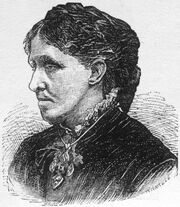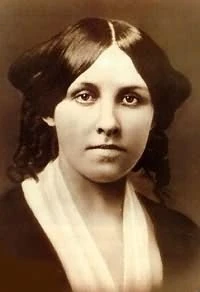Louisa May Alcott was an American novelist and poet, best known as the author of Little Women and its sequels.
She won the Caldecott Award for Little Women.
Biography[]
Childhood and Early Work[]
Alcott was born on November 29, 1832, in Germantown, which is now part of Philadelphia, Pennsylvania, on her father's 33rd birthday. She was the daughter of transcendentalist and educator Amos Bronson Alcott and social worker Abby May and the second of four daughters: Anna Bronson Alcott was the eldest; Elizabeth Sewall Alcott and Abigail May Alcott were the two youngest. The family moved to Boston in 1838, where Alcott's father established an experimental school and joined the Transcendental Club with Ralph Waldo Emerson and Henry David Thoreau. Bronson Alcott's opinions on education and tough views on child-rearing shaped young Alcott's mind with a desire to achieve perfection, a goal of the transcendentalists. His attitudes towards Alcott's sometimes wild and independent behavior, and his inability to provide for his family, sometimes created conflict between Bronson Alcott and his wife and daughters.

Louisa May Alcott commemorative stamp, 1940 issue
In 1840, after several setbacks with the school, the Alcott family moved to a cottage on 2 acres (8,100 m2) of land, situated along the Sudbury River in Concord, Massachusetts. The three years they spent at the rented Hosmer Cottage were described as idyllic. By 1843, the Alcott family moved, along with six other members of the Consociate Family, to the Utopian Fruitlands community for a brief interval in 1843–1844. After the collapse of the Utopian Fruitlands, they moved on to rented rooms and finally, with Abigail May Alcott's inheritance and financial help from Emerson, they purchased a homestead in Concord. They moved into the home they named "Hillside" on April 1, 1845.
Alcott's early education included lessons from the naturalist Henry David Thoreau, but she received the majority of her schooling from her father, who was strict and believed in "the sweetness of self-denial". She also received some instruction from writers and educators such as Ralph Waldo Emerson, Nathaniel Hawthorne, and Margaret Fuller, all of whom were family friends. She later described these early years in a newspaper sketch entitled "Transcendental Wild Oats". The sketch was reprinted in the volume Silver Pitchers (1876), which relates the family's experiment in "plain living and high thinking" at Fruitlands.
Poverty made it necessary for Alcott to go to work at an early age as a teacher, seamstress, governess, domestic helper, and writer. Her sisters also supported the family, working as seamstresses, while their mother took on social work among the Irish immigrants. Only the youngest, May, was able to attend public school. Due to all of these pressures, writing became a creative and emotional outlet for Alcott. Her first book was Flower Fables (1849), a selection of tales originally written for Ellen Emerson, daughter of Ralph Waldo Emerson.

Louisa May Alcott
As an adult, Alcott was an abolitionist and a feminist. In 1847, she and her family served as station masters on the Underground Railroad, when they housed a fugitive slave for one week and in 1848 Alcott read and admired the "Declaration of Sentiments", published by the Seneca Falls Convention on women's rights, advocating for women's suffrage and became the first woman to register to vote in Concord, Massachusetts in a school board election. The 1850s were hard times for the Alcotts. At one point in 1857, unable to find work and filled with such despair, Alcott contemplated suicide. During that year, she read Elizabeth Gaskell's biography of Charlotte Brontë and found many parallels to her own life. In 1858, her younger sister Elizabeth died, and her older sister Anna married a man by the name of John Pratt. This felt, to Alcott, to be a breaking up of their sisterhood.
Literary Success[]
In 1860, Alcott began writing for the Atlantic Monthly. When the American Civil War broke out, she served as a nurse in the Union Hospital at Georgetown, D.C., for six weeks in 1862–1863. Her letters home – revised and published in the Commonwealth and collected as Hospital Sketches (1863, republished with additions in 1869) – brought her first critical recognition for her observations and humour. It was originally written for the Boston anti-slavery paper The Commonwealth. She speaks out about the mismanagement of hospitals and the indifference and callousness of some of the surgeons she encountered. Her main character Trib showed a passage from innocence to maturity and is a "serious and eloquent witness". Her novel Moods (1864), based on her own experience, was also promising.
In the mid-1860s, Alcott wrote passionate, fiery novels and sensational stories under the nom de plume A. M. Barnard. Among these are A Long Fatal Love Chase and Pauline's Passion and Punishment. Her protagonists for these tales are willful and relentless in their pursuit of their own aims, which often include revenge on those who have humiliated or thwarted them. She also produced wholesome stories for children, and after their positive reception, she did not generally return to creating works for adults. Adult-oriented exceptions include the anonymous novelette A Modern Mephistopheles (1875), which attracted suspicion that it was written by Julian Hawthorne; and the semi-autobiographical tale Work (1873).

Louisa May Alcott
Alcott became even more successful with the publication by the Roberts Brothers of Little Women (1868), a semi-autobiographical account of her childhood with her sisters in Concord, Massachusetts. The sequel Good Wives (1869), followed the March sisters into adulthood and their respective marriages. Little Men (1871) detailed heroine Josephine's life at the Plumfield School that she founded with her husband Professor Bhaer at the conclusion of Good Wives. Jo's Boys (1886) completed the "March Family Saga".
In Little Women, Alcott based her heroine Josephine "Jo" March on herself. But whereas Jo marries at the end of the story, Alcott remained single throughout her life. She explained her "spinsterhood" in an interview with Louise Chandler Moulton: "I am more than half-persuaded that I am a man's soul put by some freak of nature into a woman's body ... because I have fallen in love with so many pretty girls and never once the least bit with any man." However, Alcott's romance while in Europe with the young Polish man Ladislas "Laddie" Wisniewski was detailed in her journals but then deleted by Alcott herself before her death. Alcott identified Laddie as the model for Laurie in Little Women, and there is strong evidence this was the significant emotional relationship of her life. Likewise, every character seems to be paralleled to some extent, from Beth's death mirroring Lizzie's to Jo's rivalry with the youngest, Amy, as Alcott felt a sort of rivalry for May, at times. Though Alcott never married, she did take in May's daughter, Louisa, after May's death in 1879 from childbed fever, caring for little "Lulu" until her death.
Little Women was well received, with critics and audiences finding it suitable for many age groups. A reviewer of Eclectic Magazine called it "the very best of books to reach the hearts of the young of any age from six to sixty,". It was also said to be a fresh, natural representation of daily life.
Louisa May Alcott's grave in Sleepy Hollow Cemetery, Concord, Massachusetts. Along with Elizabeth Stoddard, Rebecca Harding Davis, Anne Moncure Crane, and others, Alcott was part of a group of female authors during the Gilded Age, who addressed women’s issues in a modern and candid manner. Their works were, as one newspaper columnist of the period commented, "among the decided 'signs of the times'"
Later Years[]

Louisa May Alcott's grave in Sleepy Hollow Cemetery, Concord, Massachusetts.
Alcott, who continued to write until her death, suffered chronic health problems in her later years, including vertigo. She and her earliest biographers attributed her illness (and death) to mercury poisoning. During her American Civil War service, Alcott contracted typhoid fever and was treated with a compound containing mercury. Recent analysis of Alcott's illness, however, suggests that her chronic health problems may have been associated with an autoimmune disease, not acute mercury exposure. Moreover, a late portrait of Alcott shows rashes on her cheeks, which is a characteristic of lupus.
Alcott died at age 55 of a stroke in Boston, on March 6, 1888, two days after her father's death. Her last words were "Is it not meningitis?". She is buried in Sleepy Hollow Cemetery in Concord, near Emerson, Hawthorne, and Thoreau, on a hillside now known as "Authors' Ridge".
Bibliography[]
The Little Women Series[]
- Little Women or Meg, Jo, Beth and Amy (1868)
- Good Wives (1869) (sometimes published together with Little Women)
- Little Men: Life at Plumfield with Jo's Boys or simply Little Men (1871)
- Jo's Boys and How They Turned Out: A Sequel to "Little Men" or simply Jo's Boys (1886)

Bust of Louisa May Alcott
Other Novels[]
As Louisa May Alcott[]
- The Inheritance (1849, unpublished until 1997)
- Moods (1865, revised 1882)
- The Mysterious Key and What It Opened (1867)
- An Old Fashioned Girl (1870)
- Will's Wonder Book (1870)
- Work: A Story of Experience (1873)
- Beginning Again, Being a Continuation of Work (1875)
- Eight Cousins or The Aunt-Hill (1875)
- Rose in Bloom: A Sequel to Eight Cousins (1876)
- Under the Lilacs (1878)
- Jack and Jill: A Village Story (1880)
As A. M. Barnard[]
- Behind a Mask or A Woman's Power (1866)
- The Abbot's Ghost or Maurice Treherne's Temptation (1867)
- A Long Fatal Love Chase (1866 – unpublished until 1995)
Published Anonymously[]
- A Modern Mephistopheles (1877)
Short Stories for Children[]
- Aunt Jo's Scrap-Bag (1872–1882) - 66 short stories in six volumes:
- Aunt Jo's Scrap-bag
- Shawl-straps
- Cupid and Chow-Chow
- My Girls, etc.
- Jimmy's Cruise in the Pinafore, etc.
- An Old-fashioned Thanksgiving, etc.
- Lulu's Library (1886–1889) - 32 Short Stories in three volumes.
- Flower Fables (1849)
- On Picket Duty, and other tales (1864)
- Morning-Glories and Other Stories (1867) - eight fantasy stories and four poems for children, including:
- A Strange Island (1868)
- The Rose Family: A Fairy Tale (1864)
- A Christmas Song
- Morning Glories
- Shadow-Children
- Poppy's Pranks
- What the Swallows Did
- Little Gulliver
- The Whale's Story
- Goldfin and Silvertail
- Kitty's Class Day and Other Stories (1868), including:
- Kitty's Class Day
- Aunt Kipp
- Psyche's Art
- Spinning-Wheel Stories (1884) - collection of 12 short stories.
- The Candy Country (1885) - short story.
- May flowers (1887) - short story.
- Mountain-Laurel and Maidenhair (1887) - short story.
- A Garland for Girls (1888) - collection of eight short stories.
Other Short Stories and Novelettes[]
- Hospital Sketches (1863)
- Pauline's Passion and Punishment
- Perilous Play (1869) - short story.
- Lost in a Pyramid or The Mummy's Curse
- Transcendental Wild Oats (1873) - short story about Alcott's family and the Transcendental Movement.
- Silver Pitchers, and Independence: A Centennial Love Story (1876)
- Comic Tragedies (1893 - published posthumously)

